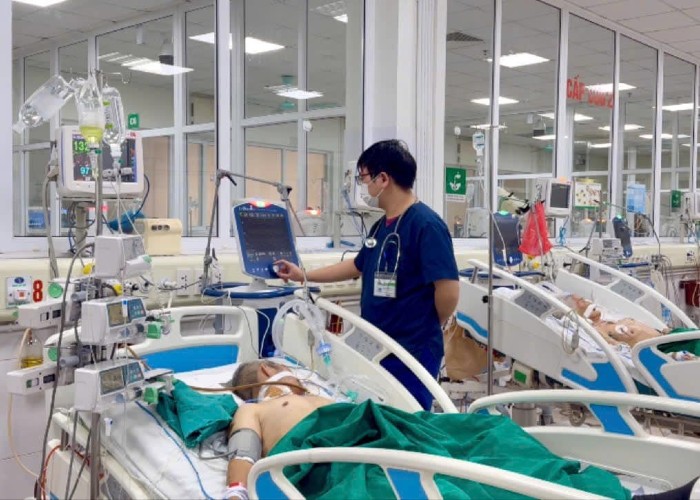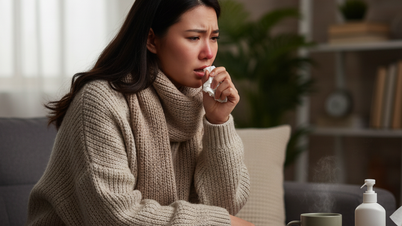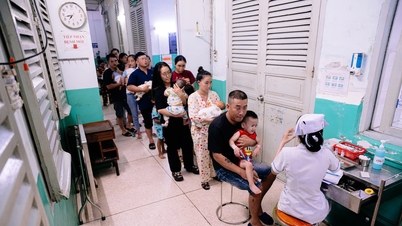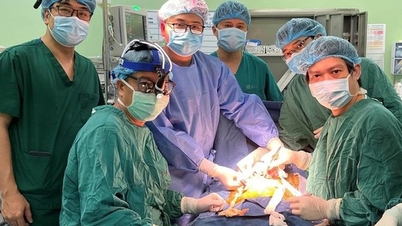On January 15, according to information from the Central Hospital for Tropical Diseases, this hospital is treating nearly 20 pneumonia patients, many of whom are seriously ill and require ventilators and continuous blood filtration.
Pneumonia cases have been reported in people of all ages, from the elderly, people with underlying diseases to immunocompromised patients and children.
 |
| Pneumonia patient is being treated at the Central Tropical Hospital. |
A typical case is that of Mr. NT (62 years old, in Hanoi ) who was hospitalized in a very serious condition, with severe difficulty breathing, purple lips, blurred consciousness, and an SPO2 index of only 47% - much lower than the normal level of over 92%.
Previously, Mr. T. had suffered from chronic obstructive pulmonary disease (COPD) for more than 10 years, regularly using corticosteroid-containing inhalers at home without following regular treatment.
About a week ago, Mr. T. came into contact with a relative who had the flu and quickly developed symptoms of high fever, increasingly severe difficulty breathing, accompanied by cough and thick phlegm.
Upon admission, he was diagnosed with severe pneumonia, influenza A infection, and Aspergillus infection (a serious consequence of prolonged corticosteroid abuse, severely weakening the immune system).
Upon admission, he was placed on a ventilator to help him breathe. Doctors also used broad-spectrum antibiotics to fight infection and antifungal drugs to kill the lung fungus. After a week of intensive treatment, his condition improved, but he is still being closely monitored to prevent recurrence of complications.
The second case is patient NVT (48 years old, Thanh Hoa ). The patient was admitted to the hospital in critical condition after 3 days of high fever, increasing difficulty breathing and low blood pressure. The patient had a history of long-term alcohol abuse, leading to cirrhosis that was diagnosed 3 years ago but was not treated regularly.
Initially, the patient was taken to a medical facility and diagnosed with right lobe pneumonia and septic shock. However, the patient's condition did not improve and quickly worsened. He was then transferred to the Emergency Department (Central Hospital for Tropical Diseases).
Here, he was diagnosed with severe pneumonia with major damage to his right lung. Tests showed that his blood clotting index was only 26% - very low compared to the normal level (70%-140%). This put the patient at risk of serious bleeding.
The patient was placed on a ventilator, continuous blood filtration to remove toxins, and strong antibiotics combined with circulatory support drugs. After 5 days of treatment, his condition gradually improved.
“Pneumonia is not only a common disease but also especially dangerous for people with underlying diseases or immunodeficiency. If not treated promptly, the disease can lead to respiratory failure, sepsis and multiple organ damage,” said Dr. Tran Van Bac, Deputy Head of the Emergency Department, Central Hospital for Tropical Diseases.
To prevent and control pneumonia, Dr. Tran Van Bac recommends that people, especially children under 5 years old, adults over 65 years old, people with underlying medical conditions, and immunodeficiency, should get a flu shot every year and a pneumococcal vaccine once in their life to reduce the risk of disease and complications.
In addition, people with underlying diseases need to comply with regular treatment and avoid self-medication, especially corticosteroids, because they can weaken the immune system.
On the other hand, people need to take measures to prevent infection such as keeping warm, wearing masks in crowded places, washing hands regularly and limiting close contact with sick people. If there are signs such as high fever, prolonged cough or difficulty breathing, go to a medical facility immediately for timely examination and treatment.
To prevent pneumonia when having the flu, it is recommended that people avoid cigarette smoke because chemicals in cigarettes can weaken the immune system, reducing the body's ability to protect against disease-causing microorganisms.
Exposure to cigarette smoke increases the levels of cytokines and pro-inflammatory immune cells such as neutrophils and macrophages, which can cause the immune system to overreact to the flu virus.
Toxic substances in cigarette smoke also paralyze cilia cells, reducing the body's sensitivity to coughs that promote the elimination of flu viruses.
This makes the patient after the flu can have prolonged pneumonia, lung parenchyma damage greater than non-smokers. People with chronic obstructive pulmonary disease (COPD) can get sick with flu.
Smokers with influenza are 1.5 times more likely to be hospitalized and 2.2 times more likely to need intensive care than people who have never smoked.
Not drinking alcohol helps limit damage to the lung immune system, which has the function of consuming and eliminating viruses and bacteria such as alveolar macrophages and phagocytic cells. This habit also increases dehydration, hinders immune function, and triggers inflammatory reactions.
Maintain personal hygiene such as washing hands regularly with soap after coughing, blowing your nose, going to the toilet, before eating or preparing food, etc. to limit the spread of other viruses and bacteria.
Clean the ears, nose and throat with warm saline to soften mucus and reduce nasal congestion. Avoid damaging the nose because if the nose is damaged, it will create an opportunity for viruses and bacteria to enter and cause inflammation. Clean the mouth to prevent pathogens from entering through the nose and throat.
Take a quick shower with warm water in a sheltered place, then dry your body quickly and gently to help relax, reduce fatigue, reduce phlegm in the throat, clear the nose, and make breathing easier.
Drink plenty of warm filtered water to avoid dehydration, help the body detoxify, increase lymph production, and improve the respiratory immune system.
Patients reduce cough, soothe sore throat, increase the ability to prevent pathogens from entering the body, easily leading to infection. Patients can drink electrolyte water, thin porridge, fruit juice, vegetables, low-sugar smoothies, ginger water, honey and lemon. On average, adults need to supplement about 1.5-2 liters of water from drinks and food.
Avoid contact with sick people or crowded places, wear a mask, keep your neck warm with a scarf when going out to avoid spreading the disease to the community, and prevent infection that can lead to pneumonia.
Eat a nutritious diet, prioritizing green vegetables, foods rich in vitamin C and zinc to improve immunity and increase resistance. Limit spicy foods, foods high in sugar or fat.
The symptoms can make the patient tired and lose appetite. You should divide your meals into many meals a day, increase liquid, easy-to-digest foods such as porridge, soup, etc. to help the body recover quickly.
Regular exercise speeds up recovery time if you have the flu and reduces the risk of complications like pneumonia. Physical activity increases the concentration and activity of white blood cells, improving immune responses. The body reduces oxidative stress, which reduces the risk of inflammatory damage in the lungs.
Maintain this habit regularly to improve blood circulation, bringing oxygen to damaged lung tissue. Respiratory muscle strength is increased, lung function is improved, reducing the risk of complications such as pneumonia. Exercise also reduces the risk of certain diseases such as diabetes, high blood pressure, obesity.
Get adequate rest to allow your body time to recover, avoid overworking or overexerting yourself. Patients need to ensure they get enough sleep and stay relaxed to strengthen their immune system.
Source: https://baodautu.vn/nhieu-benh-nhan-nguy-kich-phai-tho-may-loc-mau-vi-viem-phoi-d240875.html



![[Photo] Lam Dong: Panoramic view of Lien Khuong waterfall rolling like never before](/_next/image?url=https%3A%2F%2Fvphoto.vietnam.vn%2Fthumb%2F1200x675%2Fvietnam%2Fresource%2FIMAGE%2F2025%2F11%2F20%2F1763633331783_lk7-jpg.webp&w=3840&q=75)
![[Photo] National Assembly Chairman Tran Thanh Man holds talks with South Korean National Assembly Chairman Woo Won Shik](/_next/image?url=https%3A%2F%2Fvphoto.vietnam.vn%2Fthumb%2F1200x675%2Fvietnam%2Fresource%2FIMAGE%2F2025%2F11%2F20%2F1763629724919_hq-5175-jpg.webp&w=3840&q=75)


![[Photo] President Luong Cuong receives President of the Senate of the Czech Republic Milos Vystrcil](/_next/image?url=https%3A%2F%2Fvphoto.vietnam.vn%2Fthumb%2F1200x675%2Fvietnam%2Fresource%2FIMAGE%2F2025%2F11%2F20%2F1763629737266_ndo_br_1-jpg.webp&w=3840&q=75)












![[E - Magazine] "Special mothers" sow knowledge in "deep mountains and remote valleys"](https://vphoto.vietnam.vn/thumb/402x226/vietnam/resource/IMAGE/2025/11/20/1763613534701_e-magazine-nhun-w1200t0-di2546d199d4111349t11920l1-chuyen-ve-nhung5.webp)


























































































Comment (0)